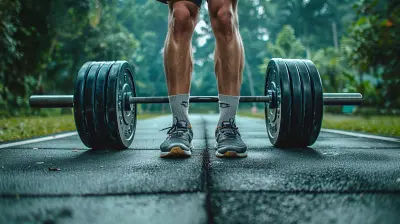The Importance of Rest Days in Maintaining a Healthy Routine
16 September 2025
Whether you're hitting the gym five times a week, running daily, or pushing through intense home workouts — you’ve probably heard the phrase “rest days are just as important as training days.” But how many of us actually take that to heart? Skipping rest days might seem like a shortcut to faster results, but your body sees it differently. In fact, consistently skipping rest could slow you down and even set you up for injury.
Let’s break down why rest days aren’t just a luxury — they’re a necessity if you’re serious about staying healthy and making long-term progress.
Why Rest Days Matter More Than You Think
Taking a rest day isn’t being lazy. It’s being smart. Your muscles, your mind, and even your immune system rely on downtime to rebuild, reboot, and come back stronger.1. Rest Days Give Your Muscles Time to Rebuild
Here's the truth: you're not building muscle during your workouts. You're actually tearing it down. Sounds brutal, right? But that's how strength training works. The real magic happens after your workouts — when you're resting.When you push your muscles hard, you create tiny tears in the muscle fibers. Your body needs rest to repair those tears, rebuild stronger fibers, and grow. Without enough recovery time? You risk chronic soreness, plateaus, or even muscle loss.
2. Reduces the Risk of Injury
Ever felt a nagging pain in your knees, shoulders, or lower back after pushing too hard? That’s your body waving a red flag. Overtraining doesn’t just tank your progress — it can flat-out sideline you.Rest days help prevent injuries caused by repetitive strain and fatigue. When your muscles are tired, your form suffers, and poor form is a one-way ticket to strains, sprains, and even worse.
3. Boosts Mental Wellness and Motivation
Let’s be real — burnout is real, both physically and emotionally. Hitting the gym every single day without a break can turn a fun, energizing routine into a dreaded task. You might wake up and think, “Ugh, another workout?” That’s not the mindset you want.Rest feeds your mental game. It keeps your mind fresh, focused, and fired up. When you're rested, you're more likely to enjoy your workouts and stick with them long-term.
4. Improves Performance
Would you believe me if I told you that not working out could make you better at working out? Sounds weird, but it’s true.When you give your body time to restore energy stores (like glycogen in your muscles), you come back stronger. You lift heavier, run faster, and last longer. So that one rest day? It’s like fueling up before a race instead of showing up on an empty tank.
What Happens If You Skip Rest Days?
Think you can get away with skipping rest? Let's take a closer look at what you might be signing up for.1. Overtraining Syndrome (Yes, It's a Thing)
Overtraining isn’t just being sore. It’s a full-on physical and mental crash. Symptoms include extreme fatigue, mood swings, insomnia, chronic soreness, and even a weakened immune system. Your workouts become less effective, and recovery takes longer. In short, more work turns into worse results.2. Hormonal Imbalances
Your hormones don’t like constant pressure. Over-exercising can mess with cortisol levels (your stress hormone) and reduce the production of essential hormones like testosterone and estrogen. That can lead to fatigue, poor sleep, and even affect reproductive health.3. Mental Burnout
If you're feeling anxious, irritable, or plain unmotivated with your workouts, your brain might be asking for a break. Without variety and rest, your fitness routine becomes a chore. And nobody wants to feel chained to their workout plan.
How Often Should You Take Rest Days?
There’s no one-size-fits-all answer here. The "right" amount depends on your fitness level, goals, workout intensity, and how well you recover.General Rule of Thumb:
- Beginners: 2-3 rest days per week- Intermediate to Advanced Athletes: At least 1-2 rest days per week
- High-Intensity Training (HIIT, heavy lifting, etc.): May need more recovery time
- Older Adults: May require more frequent or longer rest periods
Listen to your body. If it's constantly tired, sore, or you're dreading the gym — that's a sign it needs a break.
Active Recovery vs. Full Rest Days
Not all rest days are created equal. You’ve got two main choices:1. Full Rest Days
Total relaxation. No exercise. Just letting your body chill. Great for when you're feeling rundown or sore. Think: Netflix, naps, or even just a slow weekend stroll if you’re feeling antsy.2. Active Recovery
Low-intensity movement that still gets your blood flowing but doesn’t strain your system. Perfect option if sitting still makes you stir-crazy.Some active recovery ideas:
- Light yoga
- Walking
- Gentle swimming
- Stretching
- Foam rolling
Active recovery can actually speed up your muscle healing and reduce soreness. Win-win.
Rest Days and Nutrition: What Should You Eat?
Here’s what surprises a lot of people — you still need to eat well on rest days. Skimping on fuel can stall your recovery, and you could miss key nutrients your body needs to repair and rebuild.What to Focus on:
- Protein: Crucial for muscle repair. Keep your protein intake consistent.- Healthy Fats: Help reduce inflammation and support hormone health.
- Complex Carbs: Fuel glycogen replenishment even during rest.
- Hydration: Keep sipping water throughout the day.
Just because you're not burning tons of calories doesn't mean your body isn't working hard behind the scenes.
How to Know When You Need a Rest Day
Not sure if your body is asking for a break? Look out for these warning signs:1. Unusual Fatigue
If you’re sleeping well and still waking up exhausted — it’s time to consider rest.2. Sore All The Time
A little soreness is normal. But if it lingers for days, or spreads to areas you didn’t even work on? That’s a red flag.3. Declining Performance
Weaker lifts, slower runs, or poor stamina? Your body might be too tired to give its best.4. Mood Swings and Irritability
If you're snapping at people or feeling off emotionally, physical stress could be the culprit.5. Trouble Sleeping
Ironically, overtraining can make it harder to fall — or stay — asleep.Using Rest Days to Build a Sustainable Fitness Routine
Rest days are not cheat days. They're the glue that holds your fitness puzzle together.When you schedule rest, you're telling your body that recovery is as important as the hustle. You’re building a routine that will keep you consistent, strong, and injury-free for the long haul.
Try this: Instead of seeing rest as "not working out,” view it as an intentional part of your plan. Just like brushing your teeth or meal prepping — it’s part of the wellness package.
Incorporate it into your calendar. Protect it the same way you protect your workouts. Because, spoiler alert — recovery is part of training.
Final Thoughts: Rest is Progress
You’re not slacking off when you give your body a break. You’re being strategic. Consistent training without recovery is like trying to drive a car without ever stopping for gas. Eventually, it breaks down.So, the next time someone asks why you’re taking a rest day, tell them this: “Because progress happens when I pause.”
Honor your rest days like you honor your workouts, and your body will thank you with more energy, better performance, and fewer injuries.
all images in this post were generated using AI tools
Category:
Healthy RoutineAuthor:

Tiffany Foster
Discussion
rate this article
1 comments
Cecilia Hensley
Rest days are vital for recovery and mental well-being. Prioritizing them helps sustain your healthy routine and overall happiness.
September 27, 2025 at 2:36 PM

Tiffany Foster
Absolutely! Rest days are essential for physical recovery and mental health, allowing us to recharge and maintain a balanced, sustainable routine.


